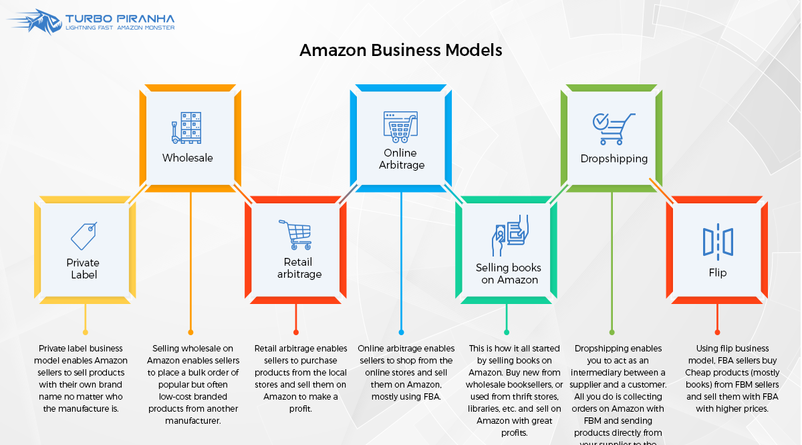Amazon has ushered in a revolutionary change in the way people sell. From the regular brick-and-mortar shops to selling online across hundreds of e-Commerce websites, a lot has changed how business is done, and Amazon has been a linchpin of this systemic transformation over the years.
Amazon has gobbled down an overwhelming share of the retail market ever since it forayed into the market as an online book store in 1994. As per the data collected by eMarketer, Amazon owns nearly 40% of the market followed by close competitor Walmart (5%).
Talking on its exponential growth, the founder, Jeff Bezos, in a letter to shareholders in 2019, stated that over 50% of the company sales come from mom-and-pop stores under the Amazon umbrella.
Amid all the frenzy, little is talked about the business models, some of which have been instrumental in writing the glorious journey of Amazon.
So, in this article, we will talk about the pros and cons of the various Amazon’s Business Models:
Private Label
A private label enables Amazon sellers to sell products with their own brand name though manufactured by someone else.
It’s like you buy from overseas and sell it on Amazon with your brand name and logo. All you’ve to do is do the groundwork—often tedious— to find the product with high demand, low competition, and long-term sustainability.
Some of the recommended Private Label product ideas on Amazon include water bottles, camera bags, LED lights, photo frames, phone screen guards, and many more. Use TURBO PIRANHA™ to search up to 36,000 items per hour.
Pros
|
Cons
|
Wholesale
Selling wholesale on Amazon enables sellers to place a bulk order of popular but often low-cost branded products from another manufacturer.
|
Pros
|
Cons
|
Retail arbitrage
Retail arbitrage enables sellers to purchase products from the local stores and sell them on Amazon to make a profit. However, the actual profit in your hand comes after deducting Amazon’s FBA fees and the actual cost of the product.
You can find plenty of options during the clearance sale in stores such as Walmart. So, fill your shopping bags and start selling on Amazon.
Pros
|
Cons
|
Online Arbitrage
Online arbitrage enables sellers to shop from the local stores as well as online and sell it worldwide, at comfortable prices. It can be considered as an extension of retail arbitrage that limits sellers to regular stores.
|
Pros
|
Cons
|
Using a bulk profit analyzer can help sellers filter down products that actually sell on Amazon, and stimulates revenue for your business.
Selling books on Amazon
This is how it all started by selling books on Amazon. For sellers, it’s a huge opportunity to access the global outreach of the international e-Commerce giant.
All you’ve to do is look for some wholesale booksellers, thrift stores, or even libraries to source new or old books in good condition to sell on Amazon, at great profit margins.
|
Pros
|
Cons
|
What if you can get a rough sales estimate of any special genre of books? fiction, non-fiction, etc? Our Amazon sales estimator gives average monthly sales numbers for specific Amazon categories.
Dropshipping
Dropshipping enables you to act as an intermediary between a supplier and a customer. All you do is collecting orders on Amazon with FBM and sending the products directly from your supplier to the customer.
Pros
|
Cons
|
All said and done, Amazon has many regulations and rules on dropshipping and the risks outweigh the often over-advertised perks. So, we recommend rethinking dropshipping before you make the final decision.
Flip
FBA sellers often buy cheap products (mostly books) from FBM (fulfilled by merchant) sellers and sell them with FBA (fulfilled by Amazon) with higher prices.
|
Pros
|
Cons
|
Wrapping up…
Every Amazon’s business model comes with its own set of pros and cons. As a potential seller on Amazon, choose a perfect risk-profit business model.
For more updates on the new features, subscribe to us today!

Pingback: Scan Wholesale Lists of Your Suppliers, Fast and Unlimited! - TURBO PIRANHA™ - Bulk Product Search, Analysis and Profit Calculation Software for Amazon Pro Sellers Using UPC, ISBN, ASIN, EAN, GCID, Sellers SKU, JAN
Pingback: New Features In Latest Version (1.0.36) - TURBO PIRANHA™ - Bulk Product Search, Analysis and Profit Calculation Software for Amazon Pro Sellers Using UPC, ISBN, ASIN, EAN, GCID, Sellers SKU, JAN